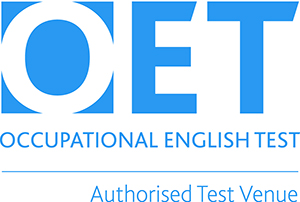|

Registration is open for
the Occupational English Test (OET) at Waikato
Institute of Education. To register, or for more
information visit
occupationalenglishtest.org
The Occupational English
Test (OET) is a language test for
health practitioners who have qualified to
practise in one country and wish to gain
provisional registration to practise their
profession in another which has
an English-speaking context.
The
Test measures the language competency of health
practitioners who are seeking registration and
the ability to practise in an English speaking
context. It is designed to ensure that language
competency is assessed in a relevant
professional context.
The OET is administered by
the OET Centre up to ten times a year in over 40
locations around the world, including at WIE in
Hamilton.
Waikato Institute of
Education is Authorised Examination Centre
for Cambridge The Occupational English Test (OET),
Candidates in New Zealand who wish to
sit for the test must apply directly via the OET
website:
http://www.occupationalenglishtest.org/.
Each OET sub-test is scored as one of five grades,
from A - E.
A is the highest grade, E is the lowest. Most
professional registration bodies require a
minimum of B in each sub-test.
Candidates can resit any component of the test
(listening, reading, speaking and writing)
rather than having to do the whole test again.
The speaking component is comprised of 2
recorded role plays where the examiner plays the
part of a patient with a particular problem. The
candidate gets 3 minutes thinking time then has
to respond professionally and refer the patient
if necessary. The test rubric can involve any
kind of medical problem and can require the
patient to be angry, upset, impatient etc.
Comparing IELTS and OET
|
IELTS |
OET |
|
+ Pros + |
|
+ Used for a wide range of purposes
including University Entrance and
Immigration purposes. |
+ Is more workplace-orientated than
IELTS and is aimed at health & medical
professions specifically. |
|
+ More widely recognised than OET. |
+ Argued to be more relevant to
nursing and healthcare professions. |
|
+ Tests are offered approximately
twice a month (25 times a year). |
+ Can re-sit individual skill areas
separately. |
|
+ Cheaper than OET to sit |
+ Test
is specific to
candidates' field of profession. |
|
– cons – |
|
_ Cannot re-sit individual bands; if one skill area is failed
candidate must re-sit entire test. |
_ Students cannot re-sit the
test until previous results have been
published. |
|
_ Requires a very high level of English to achieve 7.0 score. |
_ Offered only up to 10 times a year
in New Zealand. |
|
_ Is not directly relevant to healthcare or nursing professions. |
_ Less test centres available,
candidates may have to travel.
|
|
_ Does not have cultural component relative to New Zealand. |
_ Overall more expensive than IELTS. |
|
|



